The Syrian conflict, now in its 13th year, has generated a complex humanitarian emergency resulting from the dislocation of half of the country’s population and the disintegration of the Syrian public health system, greatly exacerbating the pre-existing global refugee crisis. The conflict and mass displacement have additionally had a severe psychological impact on civilians, resulting in high levels of mental health problems, such as depression, anxiety, and post-traumatic stress disorder. The earthquake that struck northern Syria on Feb. 6, 2023 — the worst in the region in 200 years — compounded and retraumatized an already acutely affected population.
Last February, MedGlobal deployed a team of psychiatric professionals to conduct post-disaster mental health training in northwestern Syria — their experiences led to the publication of a groundbreaking new report: “Retraumatized: The Psychological Impact of the Earthquake on War-Torn Syria.”
The Middle East Institute (MEI) is pleased to host a discussion with the report’s authors, who will present their findings and policy recommendations and explore the many wider aspects of Syria’s humanitarian crisis, including the upcoming United Nations Security Council vote on cross-border aid access into northwestern Syria.
Speakers
Dania Albaba, MD
Psychiatry Resident, Baylor College of Medicine; MedGlobal Volunteer
Nora Abdullah, MD
Psychiatry Resident, Yale New Haven Hospital; MedGlobal Volunteer
Natasha Hall
Senior Fellow, Middle East Program, CSIS
Alex Mahoney
Acting Director, Middle East, North Africa and Europe, Bureau for Humanitarian Assistance, USAID
Charles Lister, moderator
Senior Fellow; Director of Syria and Countering Terrorism & Extremism programs, Middle East Institute
Detailed Speaker Biographies
Nora Abdullah, M.D., received her medical degree with distinction as a Global Health Scholar from University of Texas Medical Branch (UTMB) in Galveston, TX. During her medical school tenure, she went on many global health trips and established a global health site in Amman, Jordan. She completed her general psychiatry training in Dallas, TX, where she was a part of the Global and Cultural Psychiatry concentration. As a resident, Dr. Abdullah established a site serving Syrian refugees and displaced people with both mental health education and psychiatric care. She recently traveled to Turkey and Syria in February 2023 with MedGlobal to assess post-disaster mental-health needs. She will be starting her fellowship in Child and Adolescent Psychiatry at Yale New Haven Hospital in July 2023.
Dania Albaba, M.D., is a third-year psychiatry resident at Baylor College of Medicine’s Menninger Department of Psychiatry and Behavioral Science. She will be an administrative chief resident in the department next year. She graduated from the University of Texas Medical Branch in 2020, where she co-founded a Physicians for Human Rights chapter. She has been training under Dr. Sophia Banu in her Clinic for International Trauma Survivors/Alliance Wellness Mental Health. She has worked with refugees both in Jordan and in Houston for the past 10 years, leading initiatives to provide aid, support, and advocacy. She recently participated in a global mental health mission to Syria and Turkey following the February 2023 earthquakes, providing training to local psychosocial support staff.
Natasha Hall is a senior fellow with the Middle East Program at the Center for Strategic and International Studies (CSIS). Natasha has over 15 years of experience as an analyst, researcher, and practitioner in complex humanitarian emergencies and conflict-affected areas with a specialty in the Middle East. Most recently, she has worked on the Syrian conflict with The Shaikh Group, GIZ, Mayday Rescue, Center for Civilians in Conflict, and the U.S. government’s Refugee Affairs Division. As a director with Mayday Rescue, she led these responses, working with the White Helmets to reinforce critical civilian infrastructure and protect civilians from explosive weapons and other consequences of the war. Hall is also the founder of Art in Exile.
Alex Mahoney is the acting office director for the Middle East, North Africa, and Europe (MENAE) in the new Bureau for Humanitarian Assistance (BHA) in the U.S. Agency for International Development (USAID). He was formerly acting deputy division chief for the Asia, Latin America, and Eurasia (ALE) Response Division in the Office of Foreign Disaster Assistance (OFDA). As acting head of the MENAE leadership team, Mahoney guides disaster response programming, contingency planning, and disaster risk reduction and resilience work across the Middle East, North Africa, and Europe. As a member of the Senior Management Team, Mahoney leads a staff of approximately 141 humanitarian experts based in offices worldwide and represents the MENAE region in BHA. Mahoney has over 22 years of experience in the humanitarian field, including approximately 18 years at USAID. During his career he has worked on over 20 major international crises, through regional teams, field assessment teams, Response Management Teams, and 13 Disaster Assistance Response Teams (DARTs) in Asia, Africa, the Middle East, Europe, and Latin America, as well as serving multiple rotations as a humanitarian advisor at the U.S. Mission to the United Nations. In recent years, he led the Syria and Iraq humanitarian responses as response manager, response director, and deputy response director, including two rotations as Turkey DART Country Team Leader.
Charles Lister is a senior fellow and the Director of the Syria and Countering Terrorism & Extremism programs at the Middle East Institute. His work focuses primarily on all-things Syria and on issues of terrorism and insurgency across the Levant. Prior to joining MEI, Lister was a Visiting Fellow at the Brookings Institution in Qatar and a Senior Consultant to the multinationally-backed Syria Track II Dialogue Initiative, in which he managed nearly three years of intensive face-to-face engagement with the leaderships of over 100 Syrian armed opposition groups.
In partnership with

Photo by OMAR HAJ KADOUR/AFP via Getty Images












